The U.S. Supreme Court has consistently protected parental rights, including it among those rights deemed fundamental. As a fundamental right, parental liberty is to be protected by the highest standard of review: the compelling interest test. As can be seen from the cases described above, parental rights have reached their highest level of protection in over 75 years. The Court decisively confirmed these rights in the recent case of Troxel v. Granville, which should serve to maintain and protect parental rights for many years to come.
As long as CPS is allowed to have an exaggerated view of their power and is allowed by state officials and the courts to exploit that power and abuse it against both children and parents, they will both be continually harmed. The constitution is there for two primary reasons, 1) to restrict the power of the government and 2) to protect the people from the government, not the government from the people. And the constitution is there to prohibit certain activity from government officials and that prohibition does not apply to one type or kind of official but to ANY government official whether it is the police, CPS or FBI.


The state may not interfere in child rearing decisions when a fit parent is available. Troxel v. Granville, 530 U.S. 57 (2000).

A child has a constitutionally protected interest in the companionship and society of his or her parent. Ward v. San Jose (9th Cir. 1992)
Children have standing to sue for their removal after they reach the age of majority. Children have a constitutional right to live with their parents without government interference. Brokaw v. Mercer County (7th Cir. 2000)
The private, fundamental liberty interest involved in retaining custody of one’s child and the integrity of one’s family is of the greatest importance. Weller v. Dept. of Social Services for Baltimore (4th Cir. 1990)
A state employee who withholds a child from her family may infringe on the family’s liberty of familial association. Social workers can not deliberately remove children from their parents and place them with foster caregivers when the officials reasonably should have known such an action would cause harm to the child’s mental or physical health. K.H. through Murphy v. Morgan (7th Cir. 1990)
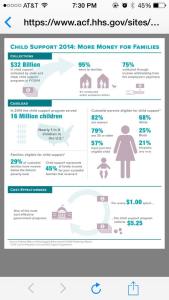
The forced separation of parent from child, even for a short time (in this case 18 hours); represent a serious infringement upon the rights of both. J.B. v. Washington County (10th Cir. 1997)
Absent extraordinary circumstances, a parent has a liberty interest in familial association and privacy that cannot be violated without adequate pre-deprivation procedures. Malik v. Arapahoe Cty. Dept. of Social Services (10 Cir. 1999)
Parent interest is of “the highest order,” and the court recognizes “the vital importance of curbing overzealous suspicion and intervention on the part of health care professionals and government officials.” Thomason v. Scan Volunteer Services, Inc. (8th Cir. 1996)
There is a presumption that fit parents act in their children’s best interests, Parham v. J. R., 442 U. S. 584, 602
Police officers and social workers are not immune from coercing or forcing entry into a person’s home without a search warrant. Calabretta v. Floyd (9th Cir. 1999)
The mere possibility of danger does not constitute an emergency or exigent circumstance that would justify a forced warrantless entry and a warrantless seizure of a child. Hurlman v. Rice (2nd Cir. 1991)
A police officer and a social worker may not conduct a warrantless search or seizure in a suspected child abuse case absent exigent circumstances. Defendants must have reason to believe that life or limb is in immediate jeopardy and that the intrusion is reasonable necessary to alleviate the threat. Searches and seizures in investigation of a child neglect or child abuse case at a home are governed by the same principles as other searches and seizures at a home. Good v. Dauphin County Social Services (3rd Cir. 1989)
The Fourth Amendment protection against unreasonable searches and seizures extends beyond criminal investigations and includes conduct by social workers in the context of a child neglect/abuse investigation. Lenz v. Winburn (11th Cir. 1995)
The protection offered by the Fourth Amendment and by our laws does not exhaust itself once a warrant is obtained. The concern for the privacy, the safety, and the property of our citizens continues and is reflected in knock and announce requirements. United States v. Becker, 929 F.2d 9th Cir.1991)
Making false statements to obtain a warrant, when the false statements were necessary to the finding of probable cause on which the warrant was based, violates the Fourth Amendment’s warrant requirement.  The Warrant Clause contemplates that the warrant applicant be truthful: “no warrant shall issue, but on probable cause, supported by oath or affirmation.” Deliberate falsehood or reckless disregard for the truth violates the Warrant Clause. An officer who obtains a warrant through material false statements which result in an unconstitutional seizure may be held liable personally for his actions under § 1983.
The Warrant Clause contemplates that the warrant applicant be truthful: “no warrant shall issue, but on probable cause, supported by oath or affirmation.” Deliberate falsehood or reckless disregard for the truth violates the Warrant Clause. An officer who obtains a warrant through material false statements which result in an unconstitutional seizure may be held liable personally for his actions under § 1983.
This warrant application is materially false or made in reckless disregard for the Fourth Amendment’s Warrant Clause. A search must not exceed the scope of the search authorized in a warrant. By limiting the authorization to search to the specific areas and things for which there is probable cause to search, the Fourth Amendment’s requirement ensures that the search will be carefully tailored to its justifications. Consequently, it will not take on the character of the wide-ranging exploratory searches the Framers of the Constitution intended to prohibit. There is a requirement that the police identify themselves to the subject of a search, absent exigent circumstances. Aponte Matos v. Toledo Davilla (1st Cir. 1998)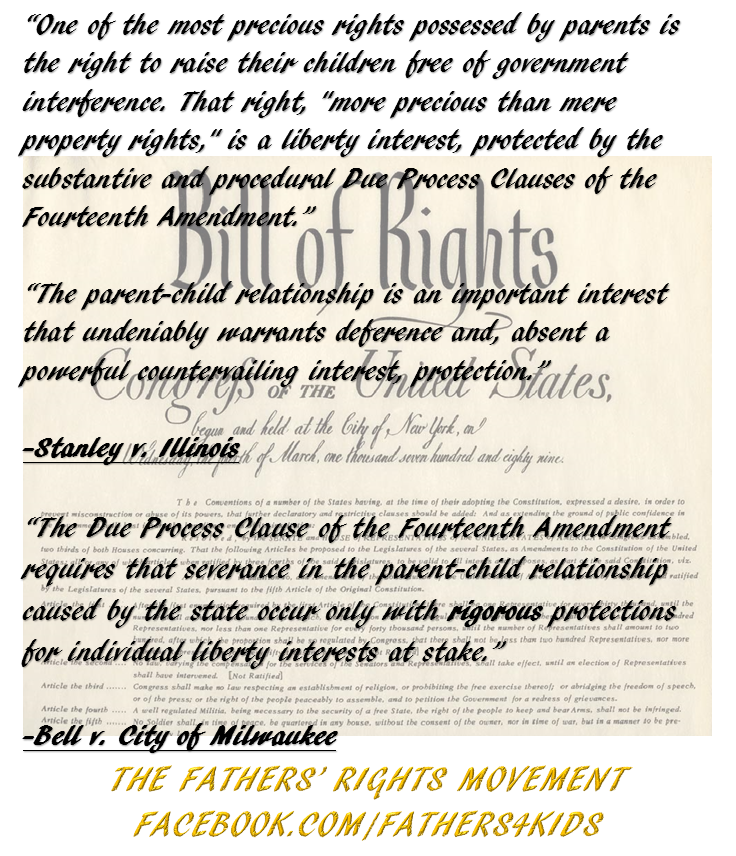
DUE PROCESS
Child’s four-month separation from his parents could be challenged under substantive due process. Sham procedures don’t constitute true procedural due process. Brokaw v. Mercer County (7th Cir 2000)
Post-deprivation remedies do not provide due process if pre-deprivation remedies are practicable. Bendiburg v. Dempsey (11th Cir. 1990)
Children placed in a private foster home have substantive due process rights to personal security and bodily integrity. Yvonne L. v. New Mexico Dept. of Human Services (10th Cir. 1992)
When the state places a child into state-regulated foster care, the state has duties and the failure to perform such duties may create liability under § 1983. Liability may attach when the state has taken custody of a child, regardless of whether the child came to stay with a family on his own which was not an officially approved foster family. Nicini v. Morra (3rd Cir. 2000)
A social worker who received a telephone accusation of abuse and threatened to remove a child from the home unless the father himself left and who did not have grounds to believe the child was in imminent danger of being abused engaged in an arbitrary abuse of governmental power in ordering the father to leave. Croft v. Westmoreland Cty. Children and Youth Services (3rd Cir. 1997)
Plaintiff’s were arguable deprived of their right to procedural due process because the intentional use of fraudulent evidence into the procedures used by the state denied them the fight to fundamentally fair procedures before having their child removed, a right included in Procedural Due Process. Morris v. Dearborne (5th Cir. 1999)
When the state deprives parents and children of their right to familial integrity, even in an emergency situation, the burden is on the state to initiate prompt judicial proceedings for a post-deprivation hearing, and it is irrelevant that a parent could have hired counsel to force a hearing. K.H. through Murphy v. Morgan, (7th Cir. 1990)
When the state places a child in a foster home it has an obligation to provide adequate medical care, protection, and supervision. Norfleet v. Arkansas Dept. of Human Services, (8th Cir. 1993)
Children may not be removed from their home by police officers or social workers without notice and a hearing unless the officials have a reasonable belief that the children were in imminent danger. Ram v. Rubin, (9th Cir. 1997)
Absent extraordinary circumstances, a parent has a liberty interest in familial association and privacy that cannot be violated without adequate pre-deprivation procedures. An ex parte hearing based on misrepresentation and omission does not constitute notice and an opportunity to be heard. Procurement of an order to seize a child through distortion, misrepresentation and/or omission is a violation of the Forth Amendment. Parents may assert their children’s Fourth Amendment claim on behalf of their children as well as asserting their own Fourteenth Amendment claim. Malik v.Arapahoe Cty. Dept. of Social Services, (10th Cir. 1999)
Plaintiff’s clearly established right to meaningful access to the courts would be violated by suppression of evidence and failure to report evidence. Chrissy v. Mississippi Dept. of Public Welfare, (5th Cir. 1991)
Mother had a clearly established right to an adequate, prompt post-deprivation hearing. A 17-day period prior to the hearing was not prompt hearing. Whisman V. Rinehart, (8th Cir. 1997)
SEIZURES (CHILD REMOVALS)
Police officers or social workers may not “pick up” a child without an investigation or court order, absent an emergency. Parental consent is required to take children for medical exams, or an overriding order from the court after parents have been heard. Wallis v. Spencer, (9th Cir 1999)
Child removals are “seizures” under the Fourth Amendment. Seizure is unconstitutional without court order or exigent circumstances. Court order obtained based on knowingly false information violates Fourth Amendment. Brokaw v. Mercer County, (7th Cir. 2000)
Defendant should’ve investigated further prior to ordering seizure of children based on information he had overheard. Hurlman v. Rice, (2nd Cir. 1991)
Police officer and social worker may not conduct a warrantless search or seizure in a suspected abuse case absent exigent circumstances. Defendants must have reason to believe that life or limb is in immediate jeopardy and that the intrusion is reasonably necessary to alleviate the threat. Searches and seizures in investigation of a child neglect or child abuse case at a home are governed by the same principles as other searches and seizures at a home. Good v. Dauphin County Social Services, (3rd Cir. 1989)
Defendants could not lawfully seize a child without a warrant or the existence of probable cause to believe the child was in imminent danger of harm. Where police were not informed of any abuse of the child prior to arriving at caretaker’s home and found no evidence of abuse while there, seizure of the child was not objectively reasonable and violated the clearly established Fourth Amendment rights of the child. Wooley v. City of Baton Rouge, (5th Cir. 2000)
For purposes of the Fourth Amendment, a “seizure” of a person is a situation in which a reasonable person would feel that he is not free to leave, and also either actually yields to a show of authority from police or social workers or is physically touched by police. Persons may not be “seized” without a court order or being placed under arrest. California v. Hodari, 499 U.S. 621 (1991)
Where the standard for a seizure or search is probable cause, then there must be particularized information with respect to a specific person. This requirement cannot be undercut or avoided simply by pointing to the fact that coincidentally there exists probable cause to arrest or to search or to seize another person or to search a place where the person may happen to be. Yabarra v. Illinois, 44 U.S. 85 (1979)
An officer who obtains a warrant through material false statements which result in an unconstitutional seizure may be held liable personally for his actions under § 1983. Aponte Matos v. Toledo Davilla, 1st Cir. 1998)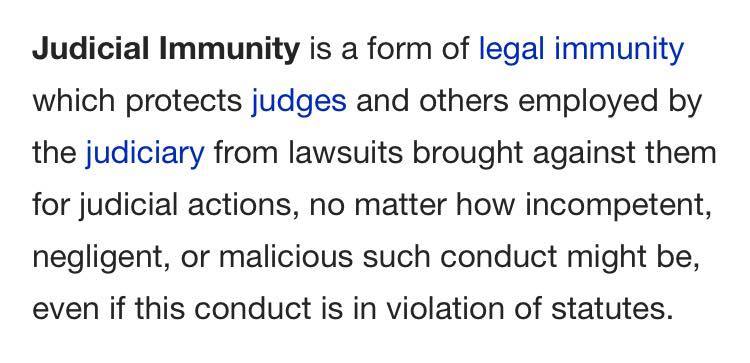
IMMUNITY
Social workers (and other government employees) may be sued for deprivation of civil rights under 42 U.S.C. § 1983 if they are named in their ‘official and individual capacity’. Hafer v. Melo, (S.Ct. 1991)
State law cannot provide immunity from suit for Federal civil rights violations. State law providing immunity from suit for child abuse investigators has no application to suits under § 1983. Wallis v. Spencer, (9th Cir. 1999)
If the law was clearly established at the time the action occurred, a police officer is not entitled to assert the defense of qualified immunity based on good faith since a reasonably competent public official should know the law governing his or her conduct. Harlow v. Fitzgerald, 457 U.S. 800, 818 (1982)
Immunity is defeated if the official took the complained of action with malicious intention to cause a deprivation of rights, or the official violated clearly established statutory or constitutional rights of which a reasonable person would have known. McCord v. Maggio, (5th Cir. 1991)
A defendant in a civil rights case is not entitled to any immunity if he or she gave false information either in support of an application for a search warrant or in presenting evidence to a prosecutor on which the prosecutor based his or her charge against the plaintiff. Young v. Biggers, (5th Cir. 1991)
Police officer was not entitled to absolute immunity for her role in procurement of a court order placing a child in state custody where there was evidence officer spoke with the social worker prior to social worker’s conversation with the magistrate and there was evidence that described the collaborative worker of the two defendants in creating a “plan of action” to deal with the situation. Officer’s acts were investigative and involved more that merely carrying out a judicial order. Malik v. Arapahoe Cty. Dept. of Social Services, (10th Cir. 1999)
Individuals aren’t immune for the results of their official conduct simply because they were enforcing policies or orders. Where a statute authorizes official conduct which is patently violation of fundamental constitutional principles, an officer who enforces that statute is not entitled to qualified immunity. Grossman v. City of Portland, (9th Cir. (1994)
Social workers were not entitled to absolute immunity for pleadings filed to obtain a pick-up order for temporary custody prior to formal petition being filed. Social workers were not entitled to absolute immunity where department policy was for social workers to report findings of neglect or abuse to other authorities for further investigation or initiation of court proceedings. Social workers investigating claims of child abuse are entitled only to qualified immunity. Assisting in the use of information known to be false to further an investigation is not subject to absolute immunity. Social workers are not entitled to qualified immunity on claims they deceived judicial officers in obtaining a custody order or deliberately or recklessly incorporated known falsehoods into their reports, criminal complaints and applications. Use of information known to be false is not reasonable, and acts of deliberate falsity or reckless disregard of the truth are not entitled to qualified immunity. No qualified immunity is available for incorporating allegations into the report or application where official had no reasonable basis to assume the allegations were true at the time the document was prepared. Snell v. Tunnel, (10 Cir. 1990)
Police officer is not entitled to absolute immunity, only qualified immunity, to claim that he caused plaintiff to be unlawfully arrested by presenting judge with an affidavit that failed to establish probable cause. Malley v. Briggs, S.Ct. 1986)
Defendants were not entitled to prosecutorial immunity where complaint was based on failure to investigate, detaining minor child, and an inordinate delay in filing court proceedings, because such actions did not aid in the presentation of a case to the juvenile court. Whisman v. Rinehart, (8th Cir. 1997)
Case worker who intentionally or recklessly withheld potentially exculpatory information from an adjudicated delinquent or from the court itself was not entitled to qualified immunity. Germany v. Vance, (1st Cir. 1989)
Defendant was not entitled to qualified immunity or summary judgment because he should’ve investigated further prior to ordering seizure of children based on information he had overheard. Hurlman v. Rice, (2nd Cir. 1991)
Defendants were not entitled to qualified immunity for conducting warrantless search of home during a child abuse investigation where exigent circumstances were not present. Good v. Dauphin County Social Services, (3rd Cir 1989)
Social workers were not entitled to absolute immunity where no court order commanded them to place plaintiff with particular foster caregivers. K.H through Murphy v. Morgan, (7th Cir. 1991)
DECISIONS OF THE UNITED STATES SUPREME COURT UPHOLDING PARENTAL RIGHTS AS “FUNDAMENTAL”
Paris Adult Theater v. Slaton, 413 US 49, 65 (1973) In this case, the Court includes the right of parents to rear children among rights “deemed fundamental.” Our prior decisions recognizing a right to privacy guaranteed by the 14th Amendment included only personal rights that can be deemed fundamental or implicit in the concept of ordered liberty . . . This privacy right encompasses and protects the personal intimacies of the home, the family, marriage, motherhood, procreation, and child rearing . . . cf . . . Pierce v. Society of Sisters; Meyer v. Nebraska . . . nothing, however, in this Court’s decisions intimates that there is any fundamental privacy right implicit in the concept of ordered liberty to watch obscene movies and places of public accommodation.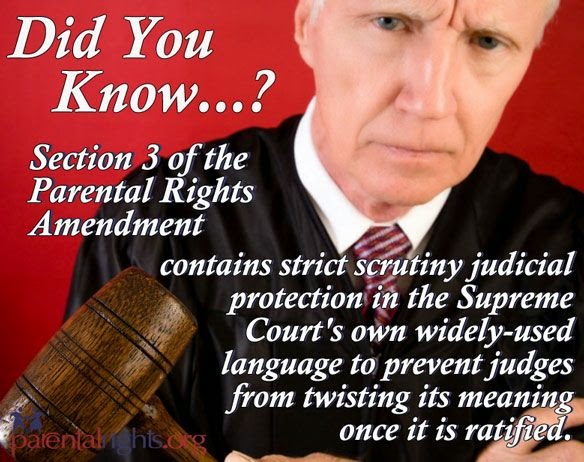
Carey v. Population Services International, 431 US 678, 684-686 (1977) Once again, the Court includes the right of parents in the area of “child rearing and education” to be a liberty interest protected by the Fourteenth Amendment, requiring an application of the “compelling interest test.” Although the Constitution does not explicitly mention any right of privacy, the Court has recognized that one aspect of the liberty protected by the Due Process Clause of the 14th Amendment is a “right of personal privacy or a guarantee of certain areas or zones of privacy . . . This right of personal privacy includes the interest and independence in making certain kinds of important decisions . . . While the outer limits of this aspect of privacy have not been marked by the Court, it is clear that among the decisions that an individual may make without unjustified government interference are personal decisions relating to marriage . . . family relationships, Prince v. Massachusetts, 321 US 158 (1944); and child rearing and education, Pierce v. Society of Sisters, 268 US 510 (1925); Meyer v. Nebraska, 262 US 390 (1923).’
The Court continued by explaining that these rights are not absolute and, certain state interests . . . may at some point become sufficiently compelling to sustain regulation of the factors that govern the abortion decision . . . Compelling is, of course, the key word; where decisions as fundamental as whether to bear or beget a child is involved, regulations imposing a burden on it may be justified only by a compelling state interest, and must be narrowly drawn to express only those interests.
Maher v. Roe, 432 US 464, 476-479 (1977) We conclude that the Connecticut regulation does not impinge on the fundamental right recognized in Roe … There is a basic difference between direct state interference with a protected activity and state encouragement of an alternative activity consonant with legislative policy … This distinction is implicit in two cases cited in Roe in support of the pregnant woman’s right under the 14th Amendment. In Meyer v. Nebraska. . . the Court held that the teacher’s right thus to teach and the right of parents to engage in so to instruct their children were within the liberty of the 14th Amendment . . . In Pierce v. Society of Sisters . . . the Court relied on Meyer . . . reasoning that the 14th Amendment’s concept of liberty excludes any general power of the State to standardize its children by forcing them to accept instruction from public teachers only. The Court held that the law unreasonably interfered with the liberty of parents and guardians to direct the upbringing and education of the children under their control …
Both cases invalidated substantial restrictions of constitutionally protected liberty interests: in Meyer, the parent’s right to have his child taught a particular foreign language; in Pierce, the parent’s right to choose private rather than public school education. But neither case denied to a state the policy choice of encouraging the preferred course of action … Pierce casts no shadow over a state’s power to favor public education by funding it — a policy choice pursued in some States for more than a century … Indeed in Norwood v. Harrison, 413 US 455, 462, (1973), we explicitly rejected the argument that Pierce established a “right of private or parochial schools to share with the public schools in state largesse,” noting that “It is one thing to say that a state may not prohibit the maintenance of private schools and quite another to say that such schools must as a matter of equal protection receive state aid” … We think it abundantly clear that a state is not required to show a compelling interest for its policy choice to favor a normal childbirth anymore than a state must so justify its election to fund public, but not private education.
Although the Maher decision unquestionably recognizes parents’ rights as fundamental rights, the Court has clearly indicated that private schools do not have a fundamental right to state aid, nor must a state satisfy the compelling interest test if it chooses not to give private schools state aid. The Parental Rights and Responsibilities Act simply reaffirms the right of parents to choose private education as fundamental, but it does not make the right to receive public funds a fundamental right. The PRRA, therefore, does not in any way promote or strengthen the concept of educational vouchers.
Parham v. J.R., 442 US 584, 602-606 (1979) This case involves parent’s rights to make medical decisions regarding their children’s mental health. The lower Court had ruled that Georgia’s statutory scheme of allowing children to be subject to treatment in the state’s mental health facilities violated the Constitution because it did not adequately protect children’s due process rights. The Supreme Court reversed this decision upholding the legal presumption that parents act in their children’s best interest. The Court ruled:
Our jurisprudence historically has reflected Western civilization concepts of the family as a unit with broad parental authority over minor children. Our cases have consistently followed that course; our constitutional system long ago rejected any notion that a child is “the mere creature of the State” and, on the contrary, asserted that parents generally “have the right, coupled with the high duty, to recognize and prepare [their children] for additional obligations.” Pierce v. Society of Sisters, 268 U.S. 510, 535 (1925) … [other citations omitted] . . . The law’s concept of the family rests on a presumption that parents possess what a child lacks in maturity, experience, and capacity for judgment required for making life’s difficult decisions. More important, historically it has been recognized that natural bonds of affection lead parents to act in the best interests of their children. 1 W. Blackstone, Commentaries 447; 2 J. Kent, Commentaries on American Law 190. As with so many other legal presumptions, experience and reality may rebut what the law accepts as a starting point; the incidence of child neglect and abuse cases attests to this. That some parents “may at times be acting against the interests of their children” … creates a basis for caution, but it is hardly a reason to discard wholesale those pages of human experience that teach that parents generally do act in the child’s best interest … The statist notion that governmental power should supersede parental authority in all cases because some parents abuse and neglect children is repugnant to American tradition.
 Parental rights are clearly upheld in this decision recognizing the rights of parents to make health decisions for their children. The Court continues by explaining the balancing that must take place:
Parental rights are clearly upheld in this decision recognizing the rights of parents to make health decisions for their children. The Court continues by explaining the balancing that must take place:
Nonetheless, we have recognized that a state is not without constitutional control over parental discretion in dealing with children when their physical or mental health is jeopardized (See Wisconsin v. Yoder; Prince v. Massachusetts). Moreover, the Court recently declared unconstitutional a state statute that granted parents an absolute veto over a minor child’s decisions to have an abortion, Planned Parenthood of Central Missouri v. Danforth, 428 US 52 (1976), Appellees urged that these precedents limiting the traditional rights of parents, if viewed in the context of a liberty interest of the child and the likelihood of parental abuse, require us to hold that parent’s decision to have a child admitted to a mental hospital must be subjected to an exacting constitutional scrutiny, including a formal, adversary, pre-admission hearing.
Appellees’ argument, however, sweeps too broadly. Simply because the decision of a parent is not agreeable to a child, or because it involves risks does not automatically transfer power to make that decision from the parents to some agency or officer of the state. The same characterizations can be made for a tonsillectomy, appendectomy, or other medical procedure. Most children, even in adolescence, simply are not able to make sound judgments concerning many decisions, including their need for medical care or treatment. Parents can and must make those judgments … we cannot assume that the result in Meyer v. Nebraska, supra, and Pierce v. Society of Sisters, supra, would have been different if the children there had announced or preference to go to a public, rather that a church school. The fact that a child may balk at hospitalization or complain about a parental refusal to provide cosmetic surgery does not diminish the parent’s authority to decide what is best for the child (See generally Goldstein, Medical Case for the Child at Risk: on State Supervention of Parental Autonomy, 86 Yale LJ 645, 664-668 (1977); Bennett, Allocation of Child Medical Care Decision — Making Authority: A Suggested Interest Analyses, 62 Va LR ev 285, 308 (1976). Neither state officials nor federal Courts are equipped to review such parental decisions.
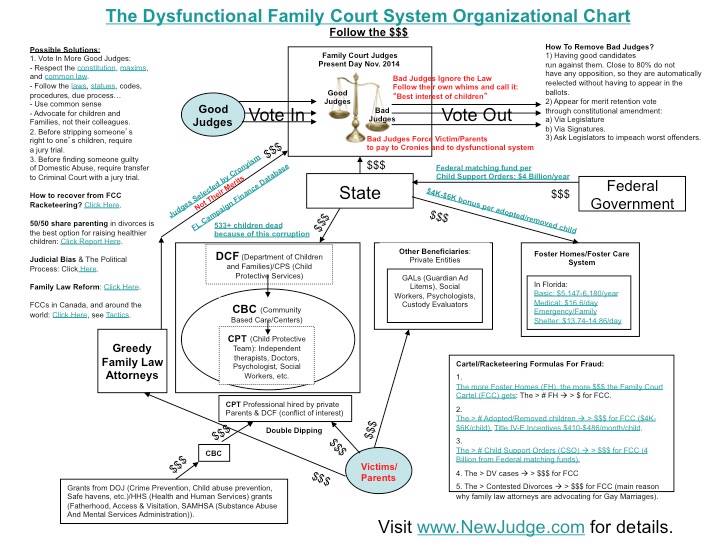
City of Akron v. Akron Center for Reproductive Health Inc., 462 US 416, 461 (1983) This case includes, in a long list of protected liberties and fundamental rights, the parental rights guaranteed under Pierce and Meyer. The Court indicated a compelling interest test must be applied. Central among these protected liberties is an individual’s freedom of personal choice in matters of marriage and family life … Roe … Griswold … Pierce v. Society of Sisters … Meyer v. Nebraska … But restrictive state regulation of the right to choose abortion as with other fundamental rights subject to searching judicial examination, must be supported by a compelling state interest.
Santosky v. Kramer, 455 US 745, 753 (1982) This case involved the Appellate Division of the New York Supreme Court affirming the application of the preponderance of the evidence standard as proper and constitutional in ruling that the parent’s rights are permanently terminated. The U.S. Supreme Court, however, vacated the lower Court decision, holding that due process as required under the 14th Amendment in this case required proof by clear and convincing evidence rather than merely a preponderance of the evidence.
The Court, in reaching their decision, made it clear that parents’ rights as outlined in Pierce and Meyer are fundamental and specially protected under the Fourteenth Amendment. The Court began by quoting another Supreme Court case:
In Lassiter [Lassiter v. Department of Social Services, 452 US 18, 37 (1981)], it was “not disputed that state intervention to terminate the relationship between a parent and a child must be accomplished by procedures meeting the requisites of the Due Process Clause”. . . The absence of dispute reflected this Court’s historical recognition that freedom of personal choice in matters of family life is a fundamental liberty interest protected by the 14th Amendment … Pierce v. Society of Sisters … Meyer v. Nebraska. The fundamental liberty interest of natural parents in the care, custody, and management of their child does not evaporate simply because they have not been model parents or have lost temporary custody of their child to the state … When the state moves to destroy weakened familial bonds, it must provide the parents with fundamentally fair procedures.
 Lehr v. Robertson, 463 US 248, 257-258 (1983) In this case, the U.S. Supreme Court upheld a decision against a natural father’s rights under the Due Process and Equal Protection Clauses since he did not have any significant custodial, personal, or financial relationship with the child. The natural father was challenging an adoption. The Supreme Court stated:
Lehr v. Robertson, 463 US 248, 257-258 (1983) In this case, the U.S. Supreme Court upheld a decision against a natural father’s rights under the Due Process and Equal Protection Clauses since he did not have any significant custodial, personal, or financial relationship with the child. The natural father was challenging an adoption. The Supreme Court stated:
In some cases, however, this Court has held that the federal constitution supersedes state law and provides even greater protection for certain formal family relationships. In those cases … the Court has emphasized the paramount interest in the welfare of children and has noted that the rights of the parents are a counterpart of the responsibilities they have assumed. Thus, the liberty of parents to control the education of their children that was vindicated in Meyer v. Nebraska … and Pierce v. Society of Sisters … was described as a “right coupled with the high duty to recognize and prepare the child for additional obligations” … The linkage between parental duty and parental right was stressed again in Prince v. Massachusetts … The Court declared it a cardinal principle “that the custody, care and nurture of the child reside first in the parents whose primary function and freedom include preparation for obligations the state can neither supply nor hinder.” In these cases, the Court has found that the relationship of love and duty in a recognized family unit is an interest in liberty entitled to Constitutional protection … “State intervention to terminate such a relationship … must be accomplished by procedures meeting the requisites of the Due Process Clause” Santosky v. Kramer … It is clear by the above case that parental rights are to be treated as fundamental and cannot be taken away without meeting the constitutional requirement of due process.
Board of Directors of Rotary International v. Rotary Club of Duarte, 481 US 537 (1987) In this case, a Californian civil rights statute was held not to violate the First Amendment by requiring an all male non-profit club to admit women to membership. The Court concluded that parents’ rights in child rearing and education are included as fundamental elements of liberty protected by the Bill of Rights.
The Court has recognized that the freedom to enter into and carry on certain intimate or private relationships is a fundamental element of liberty protected by the Bill of Rights … the intimate relationships to which we have accorded Constitutional protection include marriage … the begetting and bearing of children, child rearing and education. Pierce v. Society of Sisters … [
Michael H. v. Gerald, 491 U.S. 110 (1989) In a paternity suit, the U.S. Supreme Court ruled:
It is an established part of our constitution jurisprudence that the term liberty in the Due Process Clause extends beyond freedom from physical restraint. See, e.g. Pierce v. Society of Sisters … Meyer v. Nebraska … In an attempt to limit and guide interpretation of the Clause, we have insisted not merely that the interest denominated as a “liberty” be “fundamental” (a concept that, in isolation, is hard to objectify), but also that it be an interest traditionally protected by our society. As we have put it, the Due Process Clause affords only those protections “so rooted in the traditions and conscience of our people as to be ranked as fundamental” Snyder v. Massachusetts, 291 US 97, 105 (1934).
The Court explicitly included the parental rights under Pierce and Meyer as “fundamental” and interests “traditionally protected by our society.”
Employment Division of Oregon v. Smith, 494 U.S. 872 (1990) One of the more recent decisions which upholds the right of parents is Employment Division of Oregon v. Smith, which involved two Indians who were fired from a private drug rehabilitation organization because they ingested “peyote,” a hallucinogenic drug as part of their religious beliefs. When they sought unemployment compensation, they were denied because they were discharged for “misconduct.”
The Indians appealed to the Oregon Court of Appeals who reversed on the grounds that they had the right to freely exercise their religious beliefs by taking drugs. Of course, as expected, the U.S. Supreme Court reversed the case and found that the First Amendment did not protect drug use. So what does the case have to do with parental rights? After the Court ruled against the Indians, it then analyzed the application of the Free Exercise Clause generally. The Court wrongly decided to throw out the Free Exercise Clause as a defense to any “neutral” law that might violate an individual’s religious convictions. In the process of destroying religious freedom, the Court went out of its way to say that the parents’ rights to control the education of their children is still a fundamental right. The Court declared that the “compelling interest test” is still applicable, not to the Free Exercise Clause alone: [B]ut the Free Exercise Clause in conjunction with other constitutional protections such as … the right of parents, acknowledged in Pierce v. Society of Sisters, 268 U.S. 510 (1925), to direct the education of their children, see Wisconsin v. Yoder, 406 U.S.205 (1972) invalidating compulsory-attendance laws as applied to Amish parents who refused on religious grounds to send their children to school.19
In other words, under this precedent, parents’ rights to control the education of their children is considered a “constitutionally protected right” which requires the application of the compelling interest test. The Court in Smith quoted its previous case of Wisconsin v. Yoder: Yoder said that “The Court’s holding in Pierce stands as a charter for the rights of parents to direct the religious upbringing of their children. And when the interests of parenthood are combined with a free exercise claim … more than merely a reasonable relationship to some purpose within the competency of the State is required to sustain the validity of the State’s requirement under the First Amendment.” 406 U.S., at 233.20
Instead of merely showing that a regulation conflicting with parents’ rights is reasonable, the state must, therefore, reach the higher standard of the “compelling interest test,” which requires the state to prove its regulation to be the least restrictive means.
Hodgson v. Minnesota, 497 U.S. 417 (1990) In Hodgson the Court found that parental rights not only are protected under the First and Fourteenth Amendments as fundamental and more important than property rights, but that they are “deemed essential.”
The family has a privacy interest in the upbringing and education of children and the intimacies of the marital relationship which is protected by the Constitution against undue state interference. See Wisconsin v Yoder, 7 406 US 205 … The statist notion that governmental power should supersede parental authority in all cases because some parents abuse and neglect children is repugnant to American tradition.” In other words, under this precedent, parents’ rights to control the education of their children is considered a “constitutionally protected right” which requires the application of the compelling interest test. The Court in Smith quoted its previous case of Wisconsin v. Yoder: Yoder said that “The Court’s holding in Pierce stands as a charter for the rights of parents to direct the religious upbringing of their children. And when the interests of parenthood are combined with a free exercise claim … more than merely a reasonable relationship to some purpose within the competency of the State is required to sustain the validity of the State’s requirement under the First Amendment.” 406 U.S., at 233.20
Instead of merely showing that a regulation conflicting with parents’ rights is reasonable, the state must, therefore, reach the higher standard of the “compelling interest test,” which requires the state to prove its regulation to be the least restrictive means.
Parham, 442 US, at 603, [other citations omitted]. We have long held that there exists a “private realm of family life which the state cannot enter.” Prince v Massachusetts … A natural parent who has demonstrated sufficient commitment to his or her children is thereafter entitled to raise the children free from undue state interference. As Justice White explained in his opinion of the Court in Stanley v Illinois, 405 US 645 (1972) [other cites omitted]:
“The court has frequently emphasized the importance of the family. The rights to conceive and to raise one’s children have been deemed ‘essential,’ Meyer v Nebraska, … ‘basic civil rights of man,’ Skinner v Oklahoma, 316 US 535, 541 (1942), and ‘[r]ights far more precious … than property rights,’ May v Anderson, 345 US 528, 533 (1953) … The integrity of the family unit has found protection in the Due Process Clause of the Fourteenth Amendment, Meyer v Nebraska, supra.”
The Court leaves no room for doubt as to the importance and protection of the rights of parents.
H.L. v. Matheson, 450 US 398, 410 (1991) In this case, the Supreme Court recognized the parents’ right to know about their child seeking an abortion. The Court stated: In addition, constitutional interpretation has consistently recognized that the parents’ claim to authority in their own household to direct the rearing of their children is basic in the structure of our society.
Ginsberg v. New York, 390 US 629 (1968) … We have recognized on numerous occasions that the relationship between the parent and the child is Constitutionally protected (Wisconsin v. Yoder, Stanley v. Illinois, Meyer v. Nebraska) … “It is cardinal with us that the custody, care, and nurture of the child reside first in the parents, whose primary function and freedom includes preparation for obligations the state can neither supply, nor hinder.” [Quoting Prince v. Massachusetts, 321 US 158, 166, (1944)]. See also Parham v. J.R.; Pierce v. Society of Sisters … We have recognized that parents have an important “guiding role” to play in the upbringing of their children, Bellotti II, 443 US 633-639 … which presumptively includes counseling them on important decisions.
This Court clearly upholds the parent’s right to know in the area of minor children making medical decisions.
Vernonia School District 47J v. Acton, 132 L.Ed.2d 564, 115 S.Ct. 2386 (1995) In Vernonia the Court strengthened parental rights by approaching the issue from a different point of view. They reasoned that children do not have many of the rights accorded citizens, and in lack thereof, parents and guardians possess and exercise those rights and authorities in the child’s best interest:
Traditionally at common law, and still today, unemancipated minors lack some of the most fundamental rights of self-determination—including even the right of liberty in its narrow sense, i.e., the right to come and go at will. They are subject, even as to their physical freedom, to the control of their parents or guardians. See Am Jur 2d, Parent and Child § 10 (1987).
Troxel v. Granville, 530 U.S. 57 (2000) In this case, the United States Supreme Court issued a landmark opinion on parental liberty. The case involved a Washington State statute which provided that a “court may order visitation rights for any person when visitation may serve the best interests of the child, whether or not there has been any change of circumstances.” Wash. Rev. Code § 26.10.160(3). The U.S. Supreme Court ruled that the Washington statute “unconstitutionally interferes with the fundamental right of parents to rear their children.” The Court went on to examine its treatment of parental rights in previous cases: In subsequent cases also, we have recognized the fundamental right of parents to make decisions concerning the care, custody, and control of their children…Wisconsin v. Yoder, 406 U.S. 205, 232, 32 L. Ed. 2d 15, 92 S. Ct. 1526 (1972) (“The history and culture of Western civilization reflect a strong tradition of parental concern for the nurture and this case clearly upholds parental rights. In essence, this decision means that the government may not infringe parents’ right to direct the education and upbringing of their children unless it can show that it is using the least restrictive means to achieve a compelling governmental interest.
Crawford v. Washington No. 02-9410. Argued November 10, 2003
Decided March 8, 2004 – certiorari to the Supreme Court of Washington
Petitioner was tried for assault and attempted murder. The State sought to introduce a recorded statement that petitioner’s wife Sylvia had made during police interrogation, as evidence that the stabbing was not in self-defense. Sylvia did not testify at trial because of Washington’s marital privilege. Petitioner argued that admitting the evidence would violate his Sixth Amendment right to be “confronted with the witnesses against him.” Under Ohio v. Roberts, 448 U. S. 56, that right does not bar admission of an unavailable witness’s statement against a criminal defendant if the statement bears “adequate ‘indicia of reliability,’ ” a test met when the evidence either falls within a “firmly rooted hearsay exception” or bears “particularized guarantees of trustworthiness.” Id., at 66. The trial court admitted the statement on the latter ground. The State Supreme Court upheld the conviction, deeming the statement reliable because it was nearly identical to, i.e., interlocked with, petitioner’s own statement to the police, in that both were ambiguous as to whether the victim had drawn a weapon before petitioner assaulted him.
Held: The State’s use of Sylvia’s statement violated the Confrontation Clause because, where testimonial statements are at issue, the only indicium of reliability sufficient to satisfy constitutional demands is confrontation. Pp. 5-33.
(a) The Confrontation Clause’s text does not alone resolve this case, so this Court turns to the Clause’s historical background. That history supports two principles. First, the principal evil at which the Clause was directed was the civil-law mode of criminal procedure, particularly the use of ex parte examinations as evidence against the accused. The Clause’s primary object is testimonial hearsay, and interrogations by law enforcement officers fall squarely within that class. Second, the Framers would not have allowed admission of testimonial statements of a witness who did not appear at trial unless he was unavailable to testify and the defendant had had a prior opportunity for cross-examination. English authorities and early state cases indicate that this was the common law at the time of the founding. And the “right … to be confronted with the witnesses against him,” Amdt. 6, is most naturally read as a reference to the common-law right of confrontation, admitting only those exceptions established at the time of the founding. See Mattox v. United States, 156 U. S. 237, 243. Pp. 5-21.
(b) This Court’s decisions have generally remained faithful to the Confrontation Clause’s original meaning. See, e.g., Mattox, supra. Pp. 21-23.
(c) However, the same cannot be said of the rationales of this Court’s more recent decisions. See Roberts, supra, at 66. The Roberts test departs from historical principles because it admits statements consisting of ex parte testimony upon a mere reliability finding. Pp. 24-25.
(d) The Confrontation Clause commands that reliability be assessed in a particular manner: by testing in the crucible of cross-examination. Roberts allows a jury to hear evidence, untested by the adversary process, based on a mere judicial determination of reliability, thus replacing the constitutionally prescribed method of assessing reliability with a wholly foreign one. Pp. 25-27.
(e) Roberts’ framework is unpredictable. Whether a statement is deemed reliable depends on which factors a judge considers and how much weight he accords each of them. However, the unpardonable vice of the Roberts test is its demonstrated capacity to admit core testimonial statements that the Confrontation Clause plainly meant to exclude. Pp. 27-30.
(f) The instant case is a self-contained demonstration of Roberts’ unpredictable and inconsistent application. It also reveals Roberts’ failure to interpret the Constitution in a way that secures its intended constraint on judicial discretion. The Constitution prescribes the procedure for determining the reliability of testimony in criminal trials, and this Court, no less than the state courts, lacks authority to replace it with one of its own devising. Pp. 30-32.
147 Wash. 2d 424, 54 P. 3d 656, reversed and remanded.
Scalia, J., delivered the opinion of the Court, in which Stevens, Kennedy, Souter, Thomas, Ginsburg, and Breyer, JJ., joined. Rehnquist, C. J., filed an opinion concurring in the judgment, in which O’Connor, J., joined.
THE CONSTITUTIONAL RIGHT TO BE A PARENT
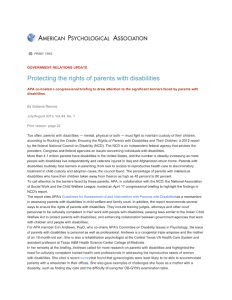 Below are excerpts of case law from state appellate and federal district courts and up to the U.S. Supreme Court, all of which affirm, from one perspective or another, the absolute Constitutional right of parents to actually BE parents to their children.
Below are excerpts of case law from state appellate and federal district courts and up to the U.S. Supreme Court, all of which affirm, from one perspective or another, the absolute Constitutional right of parents to actually BE parents to their children.
The rights of parents to the care, custody and nurture of their children is of such character that it cannot be denied without violating those fundamental principles of liberty and justice which lie at the base of all our civil and political institutions, and such right is a fundamental right protected by this amendment (First) and Amendments 5, 9, and 14. Doe v. Irwin, 441 F Supp 1247; U.S. D.C. of Michigan, (1985).
The several states have no greater power to restrain individual freedoms protected by the First Amendment than does the Congress of the United States. Wallace v. Jaffree, 105 S Ct 2479; 472 US 38, (1985).
Loss of First Amendment Freedoms, for even minimal periods of time, unquestionably constitutes irreparable injury.  Though First Amendment rights are not absolute, they may be curtailed only by interests of vital importance, the burden of proving which rests on their government. Elrod v. Burns, 96 S Ct 2673; 427 US 347, (1976).
Though First Amendment rights are not absolute, they may be curtailed only by interests of vital importance, the burden of proving which rests on their government. Elrod v. Burns, 96 S Ct 2673; 427 US 347, (1976).
Law and court procedures that are “fair on their faces” but administered “with an evil eye or a heavy hand” was discriminatory and violates the equal protection clause of the Fourteenth Amendment. Yick Wo v. Hopkins, 118 US 356, (1886).
Even when blood relationships are strained, parents retain vital interest in preventing irretrievable destruction of their family life; if anything, persons faced with forced dissolution of their parental rights have more critical need for procedural protections than do those resisting state intervention into ongoing family affairs. Santosky v. Kramer, 102 S Ct 1388; 455 US 745, (1982).
Parents have a fundamental constitutionally protected interest in continuity of legal bond with their children. Matter of Delaney, 617 P 2d 886, Oklahoma (1980).
The liberty interest of the family encompasses an interest in retaining custody of one’s children and, thus, a state may not interfere with a parent’s custodial rights absent due process protections. Langton v. Maloney, 527 F Supp 538, D.C. Conn. (1981).
Parent’s right to custody of child is a right encompassed within protection of this amendment which may not be interfered with under guise of protecting public interest by legislative action which is arbitrary or without reasonable relation to some purpose within competency of state to effect. Regenold v. Baby Fold, Inc., 369 NE 2d 858; 68 Ill 2d 419, appeal dismissed 98 S Ct 1598, 435 US 963, IL, (1977).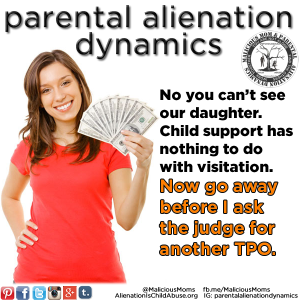
Parent’s interest in custody of her children is a liberty interest which has received considerable constitutional protection; a parent, who is deprived of custody of his or her child, even though temporarily, suffers thereby grievous loss and such loss deserves extensive due process protection. In the Interest of Cooper, 621 P 2d 437; 5 Kansas App Div 2d 584, (1980).
The Due Process Clause of the Fourteenth Amendment requires that severance in the parent-child relationship caused by the state occur only with rigorous protections for individual liberty interests at stake. Bell v. City of Milwaukee, 746 F 2d 1205; US Ct App 7th Cir WI, (1984).
Father enjoys the right to associate with his children which is guaranteed by this amendment (First) as incorporated in Amendment 14, or which is embodied in the concept of “liberty” as that word is used in the Due Process Clause of the 14th Amendment and Equal Protection Clause of the 14th Amendment. Mabra v. Schmidt, 356 F Supp 620; DC, WI (1973).
“Separated as our issue is from that of the future interests of the children, we have before us the elemental question whether a court of a state, where a mother is neither domiciled, resident nor present, may cut off her immediate right to the care, custody, management and companionship of her minor children without having jurisdiction over her in person. Rights far more precious to appellant than property rights will be cut off if she is to be bound by the Wisconsin award of custody.” May v. Anderson, 345 US 528, 533; 73 S Ct 840, 843, (1952).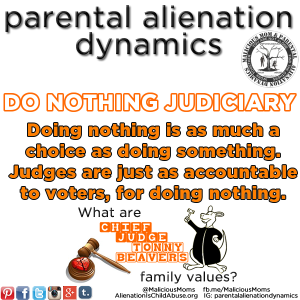
A parent’s right to care and companionship of his or her children are so fundamental, as to be guaranteed protection under the First, Ninth, and Fourteenth Amendments of the United States Constitution. In re: J.S. and C., 324 A 2d 90; supra 129 NJ Super, at 489.
The Court stressed, “the parent-child relationship is an important interest that undeniably warrants deference and, absent a powerful countervailing interest, protection.” A parent’s interest in the companionship, care, custody and management of his or her children rises to a constitutionally secured right, given the centrality of family life as the focus for personal meaning and responsibility. Stanley v. Illinois, 405 US 645, 651; 92 S Ct 1208, (1972).
Parent’s rights have been recognized as being “essential to the orderly pursuit of happiness by free man.” Meyer v. Nebraska, 262 US 390; 43 S Ct 625, (1923).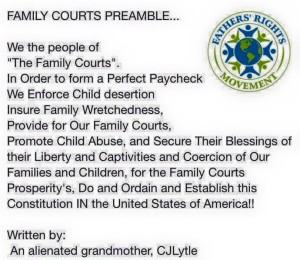
The U.S. Supreme Court implied that “a (once) married father who is separated or divorced from a mother and is no longer living with his child” could not constitutionally be treated differently from a currently married father living with his child. Quilloin v. Walcott, 98 S Ct 549; 434 US 246, 255^Q56, (1978).
The U.S. Court of Appeals for the 9th Circuit (California) held that the parent-child relationship is a constitutionally protected liberty interest. (See; Declaration of Independence –life, liberty and the pursuit of happiness and the 14th Amendment of the United States Constitution — No state can deprive any person of life, liberty or property without due process of law nor deny any person the equal protection of the laws.) Kelson v. Springfield, 767 F 2d 651; US Ct App 9th Cir, (1985).
The parent-child relationship is a liberty interest protected by the Due Process Clause of the 14th Amendment. Bell v. City of Milwaukee, 746 f 2d 1205, 1242^Q45; US Ct App 7th Cir WI, (1985).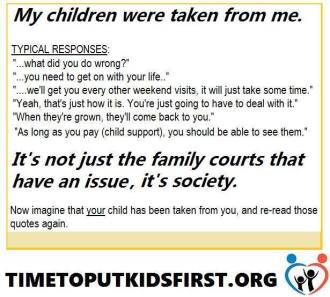
No bond is more precious and none should be more zealously protected by the law as the bond between parent and child.” Carson v. Elrod, 411 F Supp 645, 649; DC E.D. VA (1976).
A parent’s right to the preservation of his relationship with his child derives from the fact that the parent’s achievement of a rich and rewarding life is likely to depend significantly on his ability to participate in the rearing of his children. A child’s corresponding right to protection from interference in the relationship derives from the psychic importance to him of being raised by a loving, responsible, reliable adult. Franz v. U.S., 707 F 2d 582, 595^Q599; US Ct App (1983).
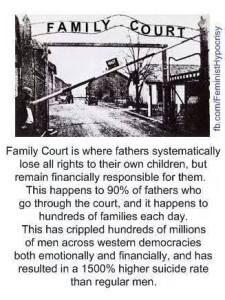
A parent’s right to the custody of his or her children is an element of “liberty” guaranteed by the 5th Amendment and the 14th Amendment of the United States Constitution. Matter of Gentry, 369 NW 2d 889, MI App Div (1983).
Reality of private biases and possible injury they might inflict were impermissible considerations under the Equal Protection Clause of the 14th Amendment. Palmore v. Sidoti, 104 S Ct 1879; 466 US 429.
Legislative classifications which distributes benefits and burdens on the basis of gender carry the inherent risk of reinforcing stereotypes about the proper place of women and their need for special protection; thus, even statutes purportedly designed to compensate for and ameliorate the effects of past discrimination against women must be carefully tailored. The state cannot be permitted to classify on the basis of sex. Orr v. Orr, 99 S Ct 1102; 440 US 268, (1979).
The United States Supreme Court held that the “old notion” that “generally it is the man’s primary responsibility to provide a home and its essentials” can no longer justify a statute that discriminates on the basis of gender. No longer is the female destined solely for the home and the rearing of the family, and only the male for the marketplace and the world of ideas. Stanton v. Stanton, 421 US 7, 10; 95 S Ct 1373, 1376, (1975).
Judges must maintain a high standard of judicial performance with particular emphasis upon conducting litigation with scrupulous fairness and impartiality. 28 USCA § 2411; Pfizer v. Lord, 456 F.2d 532; cert denied 92 S Ct 2411; US Ct App MN, (1972).
State Judges, as well as federal, have the responsibility to respect and protect persons from violations of federal constitutional rights. Gross v. State of Illinois, 312 F 2d 257; (1963).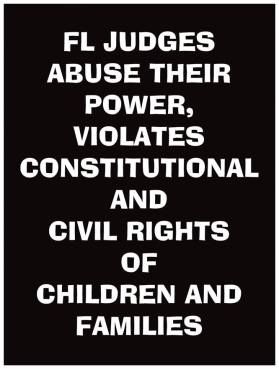
The Constitution also protects “the individual interest in avoiding disclosure of personal matters.” Federal Courts (and State Courts), under Griswold can protect, under the “life, liberty and pursuit of happiness” phrase of the Declaration of Independence, the right of a man to enjoy the mutual care, company, love and affection of his children, and this cannot be taken away from him without due process of law. There is a family right to privacy which the state cannot invade or it becomes actionable for civil rights damages. Griswold v. Connecticut, 381 US 479, (1965).
The right of a parent not to be deprived of parental rights without a showing of fitness, abandonment or substantial neglect is so fundamental and basic as to rank among the rights contained in this Amendment (Ninth) and Utah’s Constitution, Article 1 § 1. In re U.P., 648 P 2d 1364; Utah, (1982).
The rights of parents to parent-child relationships are recognized and upheld. Fantony v. Fantony, 122 A 2d 593, (1956); Brennan v. Brennan, 454 A 2d 901, (1982). State’s power to legislate, adjudicate and administer all aspects of family law, including determinations of custodial; and visitation rights, is subject to scrutiny by federal judiciary within reach of due process and/or equal protection clauses of 14th Amendment…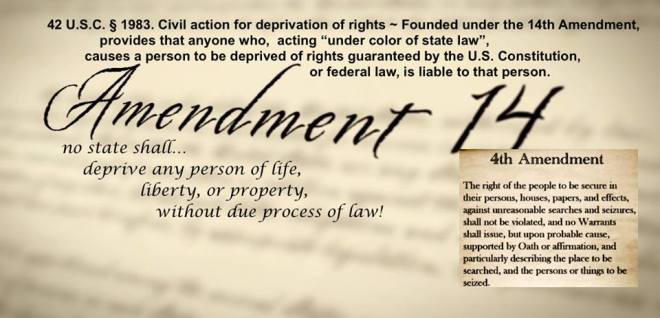 Fourteenth Amendment applied to states through specific rights contained in the first eight amendments of the Constitution which declares fundamental personal rights…Fourteenth Amendment encompasses and applied to states those preexisting fundamental rights recognized by the Ninth Amendment. The Ninth Amendment acknowledged the prior existence of fundamental rights with it: “The enumeration in the Constitution, of certain rights, shall not be construed to deny or disparage others retained by the people.”
Fourteenth Amendment applied to states through specific rights contained in the first eight amendments of the Constitution which declares fundamental personal rights…Fourteenth Amendment encompasses and applied to states those preexisting fundamental rights recognized by the Ninth Amendment. The Ninth Amendment acknowledged the prior existence of fundamental rights with it: “The enumeration in the Constitution, of certain rights, shall not be construed to deny or disparage others retained by the people.”
The United States Supreme Court in a long line of decisions has recognized that matters involving marriage, procreation, and the parent-child relationship are among those fundamental “liberty” interests protected by the Constitution. Thus, the decision in Roe v. Wade, 410 US 113; 93 S Ct 705; 35 L Ed 2d 147, (1973), was recently described by the Supreme Court as founded on the “Constitutional underpinning of … a recognition that the “liberty” protected by the Due Process Clause of the 14th Amendment includes not only the freedoms explicitly mentioned in the Bill of Rights, but also a freedom of personal choice in certain matters of marriage and family life.” The non-custodial divorced parent has no way to implement the constitutionally protected right to maintain a parental relationship with his child except through visitation. To acknowledge the protected status of the relationship as the majority does, and yet deny protection under Title 42 USC § 1983, to visitation, which is the exclusive means of effecting that right, is to negate the right completely. Wise v. Bravo, 666 F.2d 1328, (1981).
FROM THE COLORADO SUPREME COURT, 1910
In controversies affecting the custody of an infant, the interest and welfare of the child is the primary and controlling question by which the court must be guided. This rule is based upon the theory that the state must perpetuate itself, and good citizenship is essential to that end. Though nature gives to parents the right to the custody of their own children, and such right is scarcely less sacred than the right to life and liberty, and is manifested in all animal life, yet among mankind the necessity for government has forced the recognition of the rule that the perpetuity of the state is the first consideration, and parental authority itself is subordinate to this supreme power. It is recognized that: ‘The moment a child is born it owes allegiance to the government of the country of its birth, and is entitled to the protection of that government. And such government is obligated by its duty of protection, to consult the welfare, comfort and interest of such child in regulating its custody during the period of its minority.’ Mercein v. People, 25 Wend. (N. Y.) 64, 103, 35 Am. Dec. 653; McKercher v. Green, 13 Colo. App. 271, 58 Pac. 406. But as government should never interfere with the natural rights of man, except only when it is essential for the good of society, the state recognizes, and enforces, the right which nature gives to parents [48 Colo. 466] to the custody of their own children, and only supervenes with its sovereign power when the necessities of the case require it.
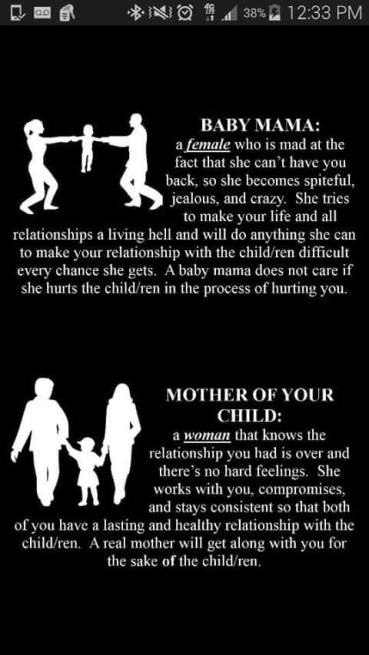 The experience of man has demonstrated that the best development of a young life is within the sacred precincts of a home, the members of which are bound together by ties entwined through ‘bone of their bone and flesh of their flesh’; that it is in such homes and under such influences that the sweetest, purest, noblest, and most attractive qualities of human nature, so essential to good citizenship, are best nurtured and grow to wholesome fruition; that, when a state is based and build upon such homes, it is strong in patriotism, courage, and all the elements of the best civilization. Accordingly these recurring facts in the experience of man resulted in a presumption establishing prima facie that parents are in every way qualified to have the care, custody, and control of their own offspring, and that their welfare and interests are best subserved under such control. Thus, by natural law, by common law, and, likewise, the statutes of this state, the natural parents are entitled to the custody of their minor children, except when they are unsuitable persons to be entrusted with their care, control, and education, or when some exceptional circumstances appear which render such custody inimicable to the best interests of the child. While the right of a parent to the custody of its infant child is therefore, in a sense, contingent, the right can never be lost or taken away so long as the parent properly nurtures, maintains, and cares for the child. Wilson v. Mitchell, 111 P. 21, 25-26, 48 Colo. 454 (Colo. 1910)
The experience of man has demonstrated that the best development of a young life is within the sacred precincts of a home, the members of which are bound together by ties entwined through ‘bone of their bone and flesh of their flesh’; that it is in such homes and under such influences that the sweetest, purest, noblest, and most attractive qualities of human nature, so essential to good citizenship, are best nurtured and grow to wholesome fruition; that, when a state is based and build upon such homes, it is strong in patriotism, courage, and all the elements of the best civilization. Accordingly these recurring facts in the experience of man resulted in a presumption establishing prima facie that parents are in every way qualified to have the care, custody, and control of their own offspring, and that their welfare and interests are best subserved under such control. Thus, by natural law, by common law, and, likewise, the statutes of this state, the natural parents are entitled to the custody of their minor children, except when they are unsuitable persons to be entrusted with their care, control, and education, or when some exceptional circumstances appear which render such custody inimicable to the best interests of the child. While the right of a parent to the custody of its infant child is therefore, in a sense, contingent, the right can never be lost or taken away so long as the parent properly nurtures, maintains, and cares for the child. Wilson v. Mitchell, 111 P. 21, 25-26, 48 Colo. 454 (Colo. 1910)
CONCLUSION
The U.S. Supreme Court has consistently protected parental rights, including it among those rights deemed fundamental. As a fundamental right, parental liberty is to be protected by the highest standard of review: the compelling interest test. As can be seen from the cases described above, parental rights have reached their highest level of protection in over 75 years. The Court decisively confirmed these rights in the recent case of Troxel v. Granville, which should serve to maintain and protect parental rights for many years to come.

As long as CPS is allowed to have an exaggerated view of their power and is allowed by state officials and the courts to exploit that power and abuse it against both children and parents, they will both be continually harmed. The constitution is there for two primary reasons, 1) to restrict the power of the government and 2) to protect the people from the government, not the government from the people. And the constitution is there to prohibit certain activity from government officials and that prohibition does not apply to one type or kind of official but to ANY government official whether it is the police, CPS or FBI.
Source
Addendum:
It is considered Treason, Perjury, a high crime to betray a sworn oath of office pursuant to 18 USC §1621 “Perjury”; 18 USC §2381 “Treason”; and 18 USC §2384 “Seditious Conspiracy.”

The US Supreme Court states: “Any judge who does not comply with his oath to the Constitution of the United States, wars against that Constitution and engages in violation of the Supreme Law of the Land.” In re Sawyer, 124 U.S. 200 (1888) “No man in this country is so high that he is above the law. NO officer of the law may set that law in defiance with impunity. All the officers of the government….are bound to obey it.” Butz V. Economou, 98 S.CT. 2894 (1978)’; Unites States v. Lee, 106 U.S. at 220, 1 S.Ct. at 261 (1882). “State courts, like federal courts, have a constitutional obligation to safeguard personal liberties and to uphold federal law.” Stone v. Powell, 428 US 465, 483 n 38, 96 S.Ct. 3037, 79 L.Ed 2d 1067 (1976).


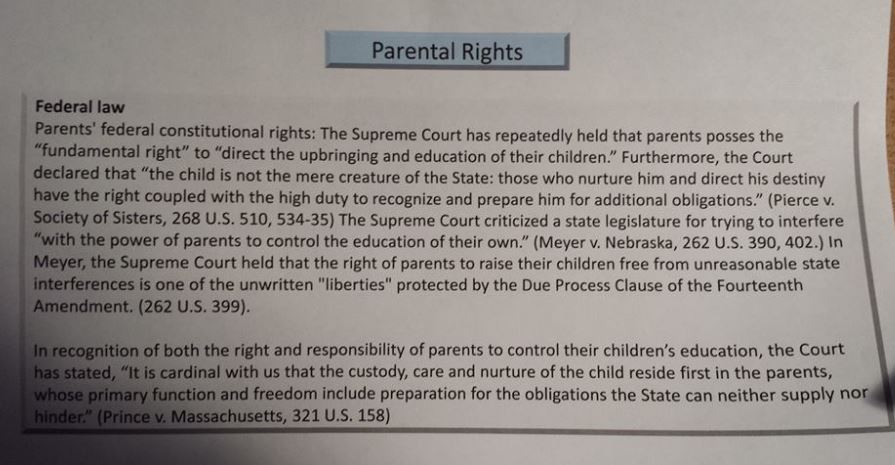















Thank you for the information I live in Kansas City Missouri and I was wondering do you know anyone that can help me with a case concerning me modified my case to fight for custody. I believe I have a very tricky difficult case.
LikeLiked by 5 people
LikeLiked by 3 people
LikeLiked by 2 people
LikeLiked by 2 people
LikeLiked by 2 people
I am extremely inspired together with your writing skills and also with the structure in your
blog. Is this a paid theme or did you modify it yourself?
Anyway stay up the nice high quality writing, it
is rare to see a great blog like this one these days..
LikeLiked by 1 person